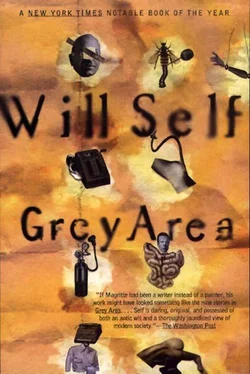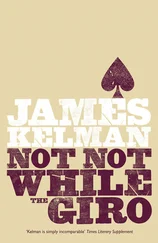But last night none of this troubled me. I was lost in the arms of Morphia. As I pushed home the plunger she spoke to me thus: ‘Left hand down. Harder. . harder. . harder!’ And around I swept, pinned by g force into the tight circularity of history. In my reverie I saw the M40 as it will be some 20,000 years from now, when the second neolithic age has dawned over Europe.
Still no services. All six carriageways and the hard shoulder are grassed over. The long enfilades of dipping halogen lights, which used to wade in concrete, are gone, leaving behind shallow depressions visible from the air. Every single one of the distance markers ‘Birmingham 86’ has been crudely tipped to the horizontal, forming a series of steel biers. On top of them are the decomposing corpses of motorway chieftains, laid out for excarnation prior to interment. Their bones are to be placed in chambers, mausoleums that have been hollowed out from the gigantic concrete caissons of moribund motorway bridges.
I was conscious of being one of these chieftains, these princelings of the thoroughfare. And as I stared up into the dark, dark blue of a sky that was near to the end of history, I was visited by a horrible sense of claustrophobia — the claustrophobia that can come only when no space is great enough to contain you, not the involution that is time itself.
I have no idea how long I must have lain there, observing the daily life of the simple motorway folk, but it was long enough for me to gain an appreciation of the subtlety with which they had adapted this monumental ruin. While the flat expanse of the carriageways was used for rudimentary agriculture, the steeply raked embankments were left for aurochs, moufflon and other newly primitive grazers.
The motorway tribe was divided up into clans or extended families, each of which had made its encampment at a particular junction and taken a different item of the prehistoric road furniture for its totem. My clan — Junction 2, that is — had somehow managed to preserve a set of cat’s eyes from the oblivion of time. These were being worn by the chieftain, bound into his complicated head-dress, when he came to see how I was getting on with decomposing.
‘You must understand,’ he said, observing the Star Trek convention, whereby even the most outlandish peoples still speak standard English, ‘that we view the M40 as a giant astronomical clock. We use the slip roads, maintenance areas, bridges and flyovers azimuthally, to predict the solstices and hence the seasons. Ours is a religion both of great antiquity and of a complexity that belies our simple agrarian culture. Although we are no longer able to read or write ourselves, our priesthood has orally transmitted down the generations the sacred revelations contained in this ancient text. ‘ With this he produced from a fold in his cloak a copy of ‘No Services: Reflex Ritualism and Modern Motorway Signs (with special reference to the M40)’, my as yet unwritten thesis.
Needless to say, this uncharacteristically upbeat ending to my narcotic vision left me feeling more melioristic than usual when I awoke this morning. Staggering to the kitchen I snapped on the radio. A disc jockey ululated an intro while I put on the kettle. The sun was rising over the model village. From where I sat I could see its rays reflected by a thousand tiny diamond-patterned windows. I sipped my tea; it tasted flat, as listless as myself. Looking into the cup I could see that the brown fluid was supporting an archipelago of scale. Dirty grey-brown stuff, tattered and variegated. I went back to the kitchen and peered into the kettle. Not only was the interior almost completely choked by scale, but the de-scaler itself was furred over, transformed into a chrysalis by mineral deposits. I resolved that today I would visit the ironmonger’s and purchase a new de-scaler.
It’s on my route — the ironmonger’s — for I’ve burnt down every chemist in Beaconsfield in the last few months, and now I must head further afield for my kaolin and morphine supplies. I must voyage to Tring, to Amersham and even up the M40, to High Wycombe.
‘Can I pay for these?’
‘Whassat?’
‘Can I pay for these — these de-scalers?’ Time is standing still in the ironmonger’s. Outside, a red-and-white-striped awning protects an array of brightly-coloured washing-up bowls from the drizzle. Inside, the darkness is scented with nails and resinous timber. I had no idea that the transaction would prove so gruelling. The proprietor of the ironmonger’s is looking at me the same way that the pharmacist does when I go to buy my kaolin and morphine.
‘Why d’you want three?’ Is it my imagination, or does his voice really have an edge of suspicion? What does he suspect me of? Some foul and unnatural practice carried out with kettle de-scalers? It hardly seems likely.
‘I’ve got an incredible amount of scale in my kettle, that’s why.’ I muster an insouciance I simply don’t feel. Since I have been accused, I know that I am guilty. I know that I lure young children away from the precincts of the model village and subject them to appalling, brutal, intercrural sex. I abrade their armpits, their kneepits, the junctures of their thighs, with my spun mini-rolls of wire. That’s why I need three.
Guilt dogs me as I struggle to ascend the high street, stepping on the heels of my shoes, almost tripping me up. Guilt about my children — that’s the explanation for the scene in the ironmonger’s. Ever since my loss of sense of scale, I have found it difficult to relate to my children. They no longer feel comfortable coming to visit me here in Beaconsfield. They say they would rather stay with their mother. The model village, which used to entrance them, now bores them.
Perhaps it was an indulgence on my part — moving to a bungalow next to the model village. It’s true that when I sat, puffing on my pipe, watching my son and daughter move about amongst the four-foot-high, half-timbered semis, I would feel transported, taken back to my own childhood. It was the confusion in scale that allowed this. For if the model village was to scale, my children would be at least sixty feet tall. Easily big enough, and competent enough, to re-parent me.
It was the boy who blew the whistle on me, grassed me up to his mother. At seven, he is old enough to know the difference between the smell of tobacco and the smell that comes from my pipe. Naturally he told his mother and she realised immediately that I was back on the M.
In a way I don’t blame him — it’s a filthy habit. And the business of siphoning off the morphine from the bottles and then baking it in the oven until it forms a smokable paste. Well I mean, it’s pathetic, this DIY addiction. No wonder that there are no pleasure domes for me, in my bricolage reverie. Instead I see twice five yards of fertile ground, with sheds and raspberry canes girded round. In a word: an allotment.
When my father died he subdivided his allotment and left a fifth of it to each of his children. The Association wouldn’t allow it. They said that allotments were only leased rather than owned. It’s a great pity, because what with the subsidies available and the new intensive agricultural methods, I could probably have made a reasonable living out of my fifth. I can just see myself. . making hay with a kitchen fork, spreading silage with a teaspoon, bringing in the harvest with a wheelbarrow, ploughing with a trowel tied to a two-by-four. Bonsai cattle wind o’er the lea of the compost heap as I recline in the pet cemetery. .
It was not to be.
Returning home from High Wycombe I add the contents of my two new bottles of kaolin and morphine to the plant. Other people have ginger-beer plants; I have a morphine plant. I made my morphine plant out of a plastic sterilising unit. It would be a nice irony, this transmogrification of taboo, were it not for the fact that every time I clap eyes on the thing I remember with startling accuracy what it looked like full of teats and bottles, when the children were babies and I was a happier man. I think I mentioned the division of chattels following the divorce. This explains why I ended up, here in Beaconsfield, with the decorative Tupperware, the baby-bouncer, sundry activity centres and the aforementioned sterilising unit. Whereas my ex-wife resides in St John’s Wood, reclining on an emperor-size bateau-lit. When I cast off and head out on to the sea of sleep my vessel is a plastic changing mat, patterned with Fred Flintstones and Barney Rubbles.
Читать дальше












